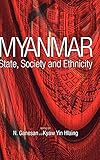Myanmar : State, Society and Ethnicity / ed. by N. Ganesan, Kyaw Yin Hlaing.
Material type: TextPublisher: Singapore : ISEAS Publishing, [2007]Copyright date: ©2007Description: 1 online resource (322 p.)Content type:
TextPublisher: Singapore : ISEAS Publishing, [2007]Copyright date: ©2007Description: 1 online resource (322 p.)Content type: - 9789812304346
- 9789812307224
- 959.1 22
- DS530 .M94 2015
- online - DeGruyter
| Item type | Current library | Call number | URL | Status | Notes | Barcode | |
|---|---|---|---|---|---|---|---|
 eBook
eBook
|
Biblioteca "Angelicum" Pont. Univ. S.Tommaso d'Aquino Nuvola online | online - DeGruyter (Browse shelf(Opens below)) | Online access | Not for loan (Accesso limitato) | Accesso per gli utenti autorizzati / Access for authorized users | (dgr)9789812307224 |
Frontmatter -- Contents -- Acknowledgements -- The Contributors -- 1. Introduction -- 2. State-society Relations in Southeast Asia -- 3. Minorities and State-building in Mainland Southeast Asia -- 4. British Policy towards Myanmar and the Creation of the ‘Burma Problem’ -- 5. Between Democracy and Economic Development: Japan’s Policy towards Burma/Myanmar Then and Now -- 6. Legitimacy in Burma/Myanmar: Concepts and Implications -- 7. Associational Life in Myanmar: Past and Present -- 8. Mapping the Contours of Human Security Challenges in Myanmar -- 9. Reflections on Confidence-building and Cooperation among Ethnic Groups in Myanmar: A Karen Case Study -- 10. Peace Initiatives among Ethnic Nationalities: The Kachin Case -- 11. The Shan in Myanmar -- 12. Reality Check on the Sanctions Policy against Myanmar -- Index
restricted access online access with authorization star
http://purl.org/coar/access_right/c_16ec
This volume focuses on some of the most important and topical questions about Myanmar. Many of these issues have not been sufficiently researched, comprehensively compiled, and comparatively examined within the broader Southeast Asian context. Especially important contributions in the book pertain to issues of historical influence and political considerations that have shaped the dominant thinking within the state and the military. There are equally important studies of sensitive topics like the political economy of the state and the level of human security in the country. The three major ethnic groups in the country — Karen, Kachin, and Shan — are also studied in detail. Some of the negotiations between the Karen and Kachin ethnic insurgent group representatives on the one hand, and the military junta on the other, are spelled out in detail. An important corollary finding is the importance of religion and religious personalities in brokering peace between the ethnic groups and the military government. Finally, the book deals with how the various ethnic groups are trying to cope with decades of conflict and reconstruct their communities.
Mode of access: Internet via World Wide Web.
In English.
Description based on online resource; title from PDF title page (publisher's Web site, viewed 01. Dez 2022)


